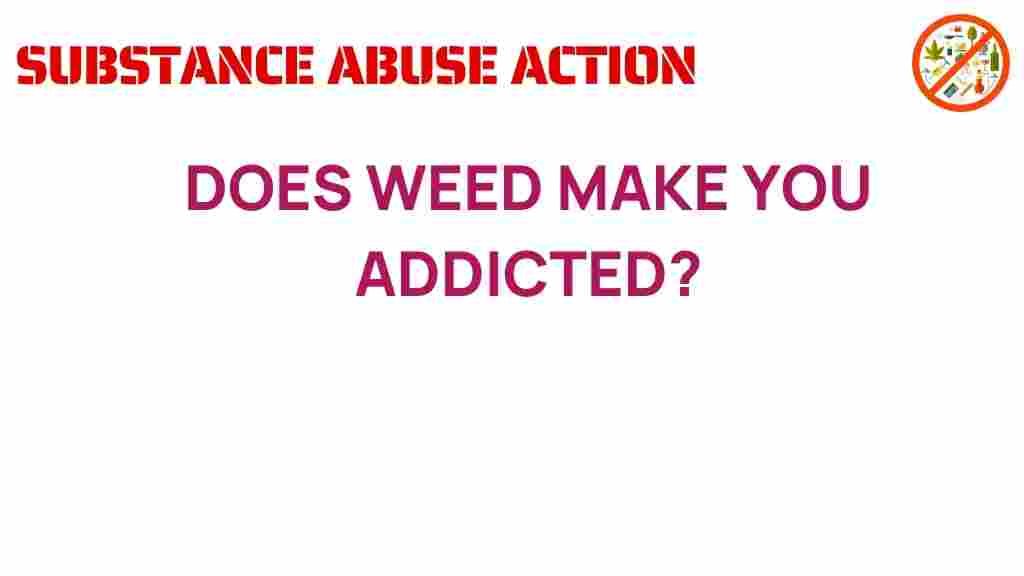Unraveling the Truth: Does Weed Really Lead to Addiction?
As cannabis becomes increasingly legalized and accepted for medicinal and recreational use, questions about its potential for addiction and dependence are more relevant than ever. The conversation around weed addiction is often clouded by myths and misconceptions. This article aims to clarify the effects of marijuana, the risk of cannabis dependence, and the implications for mental health and recovery journeys.
Understanding Cannabis and Its Effects
Cannabis, commonly known as weed or marijuana, contains psychoactive compounds, primarily THC (tetrahydrocannabinol), which interact with the brain’s endocannabinoid system. While many users report positive effects, such as relaxation and euphoria, it’s crucial to understand the broader spectrum of marijuana effects.
- **Euphoria and relaxation**
- **Altered perception**
- **Increased appetite**
- **Anxiety or paranoia** in some users
- **Cognitive impairment** affecting memory and attention
While many people use cannabis casually, others may find themselves developing a problematic relationship with the substance. This leads to the concept of cannabis dependence.
What is Cannabis Dependence?
Cannabis dependence occurs when a person experiences cravings for marijuana and continues to use it despite the negative consequences. According to research, approximately 9% of cannabis users will develop a dependence on the drug. This figure increases to about 17% for those who start using in their teens.
Signs of Weed Addiction
Recognizing the signs of weed addiction is essential for early intervention and recovery. Some common signs include:
- **Increased tolerance**: Needing more cannabis to achieve the same effects.
- **Withdrawal symptoms**: Such as irritability, insomnia, or loss of appetite when not using.
- **Neglecting responsibilities**: Prioritizing cannabis use over work, school, or relationships.
- **Continued use despite problems**: Using cannabis even when it leads to social, legal, or health issues.
The Health Implications of Cannabis Use
The health implications of cannabis use extend beyond addiction. Long-term use can lead to various mental health issues, including:
- **Anxiety and depression**: Some users may experience heightened levels of anxiety or depressive symptoms.
- **Cognitive decline**: Prolonged use can impair memory, learning, and attention.
- **Psychosis**: There is an increased risk of developing psychotic disorders for those with a predisposition, especially in heavy users.
Understanding these risks can help individuals make informed decisions about their substance use and its potential impact on their mental health.
The Recovery Journey from Cannabis Dependence
For those struggling with cannabis dependence, embarking on a recovery journey is crucial. Here’s a step-by-step process to guide individuals seeking to reclaim their lives from substance use.
Step 1: Acknowledge the Problem
The first step in any recovery journey is acknowledging that there is a problem. This can be challenging, but self-reflection and honest assessment of cannabis use are vital.
Step 2: Seek Professional Help
Consulting with a healthcare professional can provide guidance tailored to individual needs. Treatment options may include:
- **Therapy**: Cognitive-behavioral therapy (CBT) can be effective in changing thought patterns and behaviors associated with cannabis use.
- **Support groups**: Joining groups such as Marijuana Anonymous can provide community support.
- **Medication**: In some cases, medication may be prescribed to help manage withdrawal symptoms or co-occurring mental health disorders.
Step 3: Develop Coping Strategies
Learning healthy coping strategies is essential for managing cravings and avoiding relapse. Options include:
- **Mindfulness and meditation**: Techniques that help individuals stay present and manage stress.
- **Exercise**: Regular physical activity can improve mood and reduce cravings.
- **Hobbies**: Engaging in activities that bring joy can fill the time previously spent using cannabis.
Step 4: Build a Support Network
Support from friends, family, and recovery groups can significantly impact the success of the recovery journey. Open communication about struggles and progress can foster a supportive environment.
Step 5: Implement Prevention Strategies
To prevent relapse, it’s important to implement long-term strategies, such as:
- **Identifying triggers**: Recognizing situations, people, or emotions that trigger the desire to use cannabis.
- **Setting boundaries**: Avoiding environments where cannabis use is prevalent.
- **Ongoing therapy**: Continuing therapy or support group involvement can help maintain accountability.
Troubleshooting Common Challenges
The recovery journey is often fraught with challenges. Here are some common issues and tips for overcoming them:
- Cravings: Distract yourself with activities or reach out to a support person.
- Social pressure: Communicate your goals to friends and seek out those who support your recovery.
- Emotional struggles: Journaling or discussing feelings with a therapist can help manage emotions.
Drug Awareness and Education
Part of understanding weed addiction involves drug awareness and education. Knowing the facts about cannabis, its effects, and the potential for dependence can empower individuals to make informed choices. For more information, visit National Institute on Drug Abuse.
Prevention Strategies for Cannabis Dependence
Preventing cannabis dependence is crucial, especially for young people. Here are some effective prevention strategies:
- **Education programs**: Teaching about the risks of substance use in schools and communities.
- **Parental involvement**: Open discussions between parents and children about drug use can reduce the likelihood of experimentation.
- **Promoting healthy activities**: Engaging youth in sports, arts, and community service can provide fulfilling alternatives to substance use.
Conclusion
The discussion around weed addiction and cannabis dependence is complex and multifaceted. While not everyone who uses cannabis will develop an addiction, it’s essential to recognize the potential risks and health implications associated with its use. Understanding the effects of marijuana, the signs of dependence, and the pathways to recovery can empower individuals to make informed decisions. By promoting drug awareness and implementing effective prevention strategies, we can help create a healthier society.
For those on a recovery journey, remember that seeking help is a sign of strength. Every step taken is a step towards a healthier life free from addiction.
This article is in the category Addiction and created by SubstanceAbuseAction Team
